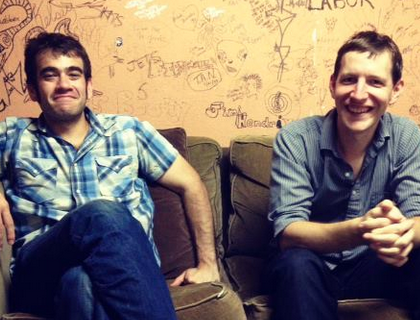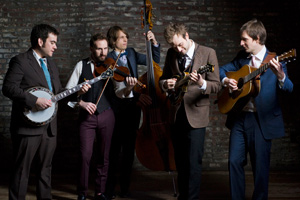On July 1, Garrison Keillor said goodbye on his final broadcast of the radio variety show A Prairie Home Companion. Fans bemoaned the loss of the avuncular host, who had for 42 years regaled them with characters like Guy Noir, cheery ads for Powdermilk Biscuits, and the imagined inhabitants of a fictional Midwestern town, “where all the women are strong, all the men good-looking, and all the children above-average.”
With Keillor’s retirement, Lake Wobegon may go the way of Atlantis, but that doesn’t mean the show is over. “It feels like something ends and something else is about to happen,” Keillor told his audience during his denouement. That something is 35-year-old Chris Thile, a multiple Grammy-winning mandolin prodigy and leader of the insanely talented Punch Brothers, whom Keillor has anointed as his successor.
Thile first made waves with Nickel Creek, the new-grass band he co-founded in his home state of California at age 12. Since then, he has appeared dozens of times as a musical guest on Keillor’s program and collaborated with virtuosos such as Béla Fleck and Yo-Yo Ma, and in 2012 he was awarded a MacArthur Foundation Fellowship (a.k.a. “genius grant”).
In his new role as radio host, Thile aims to preserve the spoken-word humor, musical showmanship, and even the fake commercials that have garnered A Prairie Home Companion 3 million loyal fans in the United States. But judging by the guests, Thile’s Companion already feels edgier than Keillor’s ever did—White Stripes guitarist Jack White, comics John Hodgman and Aparna Nancherla, soul group Lake Street Dive, and cellist Esperanza Spalding will appear on the first few episodes.
Here are a handful of reflections Thile shared with me as he prepares to step into Keillor’s shoes on October 15:
On his first Prairie Home Companion gig: “My life has always been intertwined with the show. Some of my very earliest memories are being in our living room, listening to the show when I was two years old, and Garrison’s voice emanating from the radio in the corner. At that age it was kind of unclear to me whether that might actually be my dad’s voice just coming through the radio instead of from his body. Not that they sound similar—but just sort of this warm, authoritative, male voice.
Playing the show for the first time at 15, I was already aware of the enormity of the moment. Even for this little bug, it was a realization of a goal at a very young age—like, ‘Oh, this is something I’ve dreamed of happening.’ Garrison signed my program and wrote me a limerick.
There once was a fellow named Thile. Played mandolin wild and freely. He played for the town, while riding around, on a bicycle doing a wheelie!
On the fateful phone call from Keillor: “He called me out of the clear blue sky. I had his number in my phone, but it was always nerve-wracking when he would call and his name shows up on caller ID. You know, it’s a long, grand name accompanied by this incredibly grand voice. I was practicing, in the middle of a duet with the bassist Edgar Meyer. I let it go to voicemail because I thought to myself, ‘He probably wants me to play on next week’s show or something, and there’s no way I can do it.’ I listen to the voicemail and it says [imitates Keillor‘s voice], ‘Chris I have something that may be of some interest to you…’
“So I called him back and he outlined his exact plan. I was pacing as it started dawning on me what he was talking about. I had to leave the bus and just started like walking all over Ann Arbor trying to process all of this. As he came to the end of the pitch, I am struggling for words, because even then there was this air of inevitability about it. Almost like the forehead slap of, Of course this is what I’m going to do; of course I’m going to try this, as crazy and scary as it seemed at the time. He said, ‘You host a couple of shows, you know, early next year, and we’ll see where we are.’ And that’s what we did.”
On how Thile’s Prairie Home Companion will be different: “We’re going to have a spoken-word guest every show, who may often be a comedian, actor, a poet. I suspect you’ll still be hearing about Powdermilk Biscuits, and you may still be encouraged to eat enough ketchup and potentially be soothed by a piece of rhubarb pie, because we just can’t help ourselves. But the world has changed a lot in the last 40 years. Garrison was keenly aware of that, but you could look out into the audience at a lot of these live shows and see a lot of 50-plus-year-old white folks.
“My dearest hope is that we can create the kind of environment that’s representative of everyone in this beautiful country of ours, especially now. These are hard times. The last couple nights, it’s like I haven’t been able to look directly at the TV—as if it’s the sun. I try and catch up over Twitter afterward, almost it’s like that board from elementary school with the little hole cut into it so you can check out the sun, like check out an eclipse, with those little rudimentary tools. It’s an oft-uttered statement but these are troubled times. I am all the more fervently seeking the beauty that human beings are capable of developing, and I want the show to be a place for those beautiful things. So that, quite frankly, is our great goal, our great challenge.”
On his favorite musical act of late: “I was with Béla Fleck and his wife Abigail Washburn, and they were spending time with this adopted daughter of someone they know. And this little girl, she was improvising a song and making up lyrics on the fly. She sang the words, ‘My heart breaks into song.’ And I was dumbstruck. I mean I didn’t stop the song, but afterward I asked her, ‘Did you say, ‘My heart breaks into song?” And she said, ‘Yeah.’ I would just love for this show to be an opportunity for everyone’s hearts to break into song—or to break into laughter, to break into thought, to break into imagination. Our hearts should be breaking right now. But to figure out a way to turn that into energy we can use to comfort each other.”

















